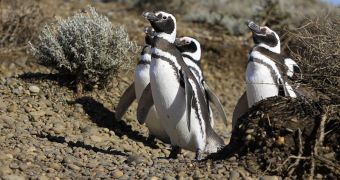Researchers at the University of Washington, led by conservation biologist Dee Boersma, have been analyzing the state of penguin populations in Punta Tombo, Argentina, for well over 30 years. The team now says that the effects of climate change are slowly killing off these penguins, which number in the hundreds of thousands at this location.
According to Boersma, the number of Magellanic penguins living in this part of Argentina has dropped about 20 percent below its initially-recorded value, some 30 years ago. The researcher says that she and her team have outfitted trackers to many specimens in this colony.
Data collected from the devices indicate that increasingly large numbers of penguins swim farther and farther away from the shoreline in search of food. “One of the things that I certainly didn't anticipate when I started this is that these penguins could tell us as much as I think they are […] about the environment,” the expert reveals.
In a study conducted in 2010, Boersma determined that rainstorms were partially to blame for the population collapse. These atmospheric events are becoming stronger, bigger and, yes, wetter than ever before. What this means for the penguins is significantly more dead chicks, which takes a huge toll on the total population levels.
“When you get three years in a row where lots of chicks die because they get wet, it hits you pretty hard,” she says. Additionally, water temperature changes in the Atlantic Ocean are causing currents to change course, and are making the staple food of these penguins – squids – swim farther from the shores.
One of the most important things to realize about penguins, Boersma says, is that they can die from hypothermia, even if they are well-known for their resilience in environments as harsh as those in polar regions. “You have to really know penguins to understand why,” the expert says.
Chicks are covered in down. Their juvenile plumage […] doesn't even really come in to protect them at all until they are older than 40 days. So until they get some of their juvenile plumage, they're not waterproof – at all,” the investigator says.
Another thing that makes chicks more vulnerable to early death via hypothermia is the fact that penguin moms now appear to hatch their offspring over a 6-week period, whereas before they tended to hatch their eggs over a 2-week period.
This prolonged hatching season – for which no scientifically-valid explanation exists at this time – makes chicks vulnerable to rainstorms for longer periods of time, contributing to overall population decline," NPR reports.

 14 DAY TRIAL //
14 DAY TRIAL //